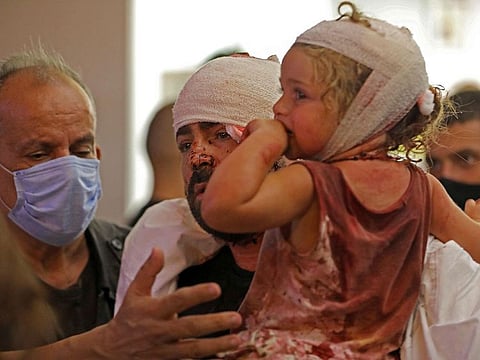Beirut: Intellectual capital of Arab world bleeds
The blast was the culmination of years of mismanagement and neglect by its elite

It happened in the middle of an unforgiving pandemic, economic meltdown and widespread anger at a political elite that is more concerned about pursuing its parochial agenda than serving the public interest, an elite whose woeful inadequacy and heedless ways were deplored by ordinary Lebanese everywhere, an elite that faced — but somehow was able to fend off — a national protest movement that had earlier called for reform.
That was Beirut on the eve of the mega nitrate explosion that rocked it on August 4, devastating large swaths of the city and leaving close to 180 dead, thousands wounded and countless homeless. The blast was — and that we know — the culmination of years of mismanagement and neglect by that very elite.
Yes, it happened in Beirut, once the Arab world’s most fondly regarded city and arguably its intellectual capital, since the mid-1950s a magnet to its poetes maudits, political exiles and pan-Arab intelligentsia — the Paris of the Middle East, a moniker it had long acquired.
When the dreaded nitrate explosion devastated the city last week, visiting irremediable suffering on its denizens, the Lebanese people’s wounds had not yet healed and their broken spirit had not mended from the conflict. It made for a tragedy all the more crushing, not just for the Lebanese people but for all peoples in the Arab worldFawaz Turki
I was there in those halcyon days, in a then laid-back city where, as a teenager I made my original leap to a maturing consciousness.
The Paris of the Middle East. The intellectual capital of the Arab world. And so it was, especially in those tortuous years that followed the shock and humiliation of the first Arab-Israeli war, the dismemberment of Palestine and the entrenchment of Zionism in the heartland of our world in 1948.
Also Read: Arab states are Lebanon’s real allies
And just as in Paris, where French intellectuals, poets and philosophers like Jean-Paul Sartre, Simone de Beauvoir and Albert Camus gathered at cafés in the Latin Quarter, across from the Sorbonne, to discuss the fate of post-war France, their Arab counterparts, like Hisham Sharabi, George Habash and Nizar Kabbani gathered at cafés in the Hamra Quarter, across from the American University of Beirut — mostly at Faisal’s, the favoured hangout of hard-core theoreticians, ideologues and advocates of Arab nationalism — to discuss Antoun Sa’adi’s Syrian Nation versus Michel Aflak’s Arab Nation, Marxism versus Nasserism, Arabism versus Regionalism. And the rest of it.
The city of culture
The city buzzed with the ideas of boots-on-the-ground, Antonio Gramsci “organic intellectuals” anxious to put in their two-cents worth. Bookstores proliferated in every neighbourhood. (One street off Martyrs Square was lined exclusively with them.) Dozens of newspapers and periodicals, in Arabic, English and French, sold off the ubiquitous news-stands.
Movie theatres were everywhere, featuring both fluff from the US, like Pillow Talk, starring Doris Day and Rock Hudson, and art-house, New Wave productions from France, like Alain Resnais’s Hiroshima Mon Amour.
Heck, you could even splurge on an issue of Cahier du Cinema for 2 Liras — a king’s ransom knocked off a teenager’s weekly allowance — and later, sitting at Faisal’s across from your friends, talk about the work of directors like Goddard, Truffaut and Rivette, showing yourself off as a budding cineaste.
Whichever way you looked, there was constant preoccupation with the life of the mind. It was as if ideas were not a luxury, a frivolous pursuit, but a rigorous need in one’s quotidian life.
And it was all, I say, laid-back — zestful, engaging, fun. Beirut was a city so laid-back in those days that when, on July 15, 1958, 1,700 US Marines stormed its beaches, ready for combat, weapons cocked, backed by warships in the Mediterranean — there to save incumbent President Camille Chamoun from being deposed — they encountered, well, Gee, a whole bunch of Beirutis languidly sunbathing on the beach and teenagers in swimsuits playfully offering to help them set up their equipment.
Propulsive Mediterranean rhythm
That was Beirut then, an urbane city that beat with the propulsive rhythm of the Mediterranean Sea, on whose shore it sat, and the timeless resolution of Mount Lebanon, at whose foot it lay. Beirut then was living a belle époque.
But — yes, there’s a but — Beirut, like the rest of the country it was a capital of, was overripe with anarchic compulsions, political, class and sectarian compulsions, simmering beneath the garden surface of a belle époque — as those that acted as the backdrop to Europe’s own belle époque showed in 1914 — always have a cruel, preordained equifinality to them.
In short, there had been hotness in the blood and the Lebanese people called for it on the streets. By 1975, these folks had turned on each other in an orgy of self-hate that lasted 15 years and left Lebanon’s national soul bruised and mortally wounded.
When the dreaded nitrate explosion devastated the city last week, visiting irremediable suffering on its denizens, the Lebanese people’s wounds had not yet healed and their broken spirit had not mended from the conflict. It made for a tragedy all the more crushing, not just for the Lebanese people but for all peoples in the Arab world.
— Fawaz Turki is a journalist, lecturer and author based in Washington. He is the author of The Disinherited: Journal of a Palestinian Exile
Sign up for the Daily Briefing
Get the latest news and updates straight to your inbox








